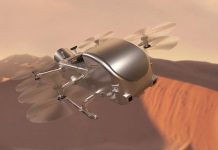The Chinese space agency (CNSA) has released a portion of the footage of the parachute opening of the Zhurong rover on Mars, all just a few months after the one shown by NASA for the Perseverance rover.
The CNSA (Chinese space agency) has released a new video regarding the landing of the Martian rover Zhurong. In the short sequence, we see the parachute used to slow the descent of the rover on the Red Planet that unfolds in the tenuous atmosphere.
NASA, just a few months ago, had released a similar video showing the terminal stages of the Perseverance landing. That part of the descent sequence is very similar between the two rovers even if it differs due to the use of a sky crane (NASA) or a lander (CNSA). In the case of the Chinese version, we do not know if there is a “hidden message” as in the case of Perseverance wherein binary code you could read “Dare Mighty Things” and the coordinates of the JPL.

The video of Zhurong’s parachute opening on Mars
Due to the density of the atmosphere of Mars, the parachute used for the landing of the rovers must be opened when the speed is still quite high, at least Mach 2. This allows to slow down the structure that supports the rover (lander or sky crane ) enough. to allow the start of the subsequent phases.
The phases of the Chinese rover Zhurong landing on Mars involved separation from the Tianwen-1 orbiter at about 125 km from the surface. Subsequently, the protection capsule was self-balancing through some aerodynamic flaps that allowed it to get close to the landing area.
The parachute opened after five minutes when the altitude had dropped to about 11 km (and this is the phase shown in the short video). The parachute thus slowed down the descent allowing the lower heat shield to be released. After another two minutes and an altitude of one or two kilometres from the Martian surface, the parachute and the rear structure separated, leaving the Zhurong rover attached to the lander free.
At this point, radar and cameras made it possible to “choose” the best landing area using a rocket positioned in the lower area to balance the final stages of the descent arriving with a speed of about 1.5 m / s (vertical) and less than 1 m / s (horizontal). After 8.5 minutes, the landing of the Chinese rover ended. Recall that in recent weeks the parachute (but also the rover itself) has been sighted both by the Tianwen-1 orbiter and by the US probe MRO.




